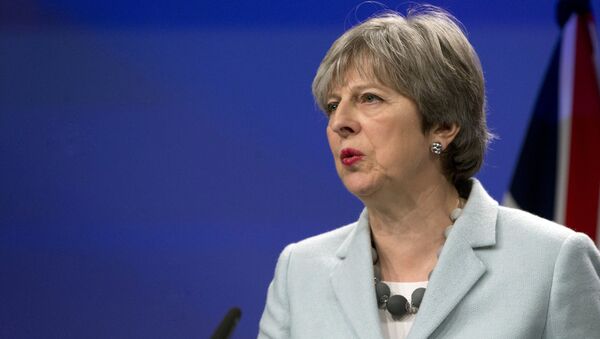As divisions deepen within the British government surrounding Brexit, the position of British premier Theresa May appears to be under greater scrutiny following the latest embarrassment caused by the leaking of a covert study carried out on the economic impact facing the UK following its proposed exit from the European bloc.
It is understood the document — which revealed Britain will be worse off under every scenario despite any future new trade deals — was meant to be seen only by government ministers.
Amid growing reports that senior party donors are now demanding Mrs. May quit and stand down as prime minister, the latest economic findings will do little to quell the growing political split within the Conservative ranks.
Time running out?
In an interview, Adam Garrie, an influential political analyst and director of Eurasia Future, explained the study is just the latest in a series of multiple blows currently facing the UK government.
"It will also be seen as good news for campaigners calling for a second referendum regarding the UK's EU membership as well as those who believe parliament must block Brexit," he told Sputnik.
"May has hung on quite a long time considering the fact that she relies on a handful of DUP MPs to cling to ppower. Her lack of popularity in her own party may, however, lead to a Tory coup against her. These reports will certainly galvanise that opposition," Mr. Garrie added.
The pressure mounts on Theresa May's administration as another Tory MP, Marcus Fysh in the Telegraph today calls for a true 'Brexit Cabinet', slamming certain people who "see economics as more important than anything else, including sovereignty". pic.twitter.com/WvfT9ojDxm
— Cazawilnot.leave (@carole99897) 29 January 2018
Philip Hammond could be sacked as pressure mounts on Theresa May | Politics | News https://t.co/AvCFzdncvJ pic.twitter.com/CqdNXPOuMc
— News Jox (@NewsJox) 28 January 2018
To add further to her woes, Mrs. May is scheduled to leave Britain to fly to China for talks — leaving her critics with the opportunity to whip up further trouble over her leadership.
Gloomy Outlook
The impact assessments obtained by BuzzFeed News, titled EU Exit Analysis — Cross Whitehall Briefing, suggests UK growth would be eight per cent less over 15 years if Britain quit without securing a deal. Even the softest Brexit option — remaining in the single market — would see growth decline by two per cent over the same period, according to the report.
Possible gains from any trade deals being struck with the United States and other global economies, including China, India and Asia, would amount to just 10 per cent of the losses in growth.
UK spells out #Brexit transition demands as pressure mounts on prime minister https://t.co/ixPx3dvIL8
— SCMP News (@SCMP_News) 27 January 2018
The pessimistic picture being painted over the UK's future growth potential has, however, been challenged by one leading financial and economic expert.
Professor Steve Keen of Kingston University, London, said mainstream economists see specialisation as the source of growth, with their models being biased by the belief to conclude any loss of this, due to raising tariff barriers or exiting customs unions, will necessarily reduce growth.
Positive
He told Sputnik: "In fact, growth comes from innovation and investment, expanding the market may help in some instances by giving a larger market to take advantage of economies of scale, but the direct effect of 'specialisation' is, in fact, to reduce investment and demand in the industries negatively impacted by dropping trade barriers.
"Mainstream economists literally assume that the displaced capital in these industries seamlessly and costlessly move to the expanded industry, which is absurd," explained the professor.
The empirical record shows that countries achieve growth first by restricting international competition, then putting their industries under pressure to export over time, he continued, adding this is the pattern used by Japan, Korea and, indeed, the UK and Germany in the early industrial revolution.
Naive
Professor Keen questioned also the belief that the Eurozone is going to grown seamlessly from now on is also "naive."
"They are still straightjacketed by the Euro, and their governments are forced by the Maastricht Treaty to reduce government spending, which directly reduces GDP growth. Euro countries are growing now because private credit is expanding, but the headroom for that (except in Germany) is very limited, given the amount of private debt these economies accumulated, and any revival will run out in a few years," he told Sputnik.
"So, the reports are too pessimistic, as they were when they expected Armageddon after Brexit, and nothing happened," said the professor.
The views and opinions expressed by Adam Garrie and Steve Keen are those of the speakers and do not necessarily reflect those of Sputnik.




